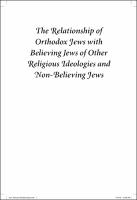Please use this identifier to cite or link to this item:
https://hdl.handle.net/20.500.12202/4531| Title: | The relationship of Orthodox Jews with believing Jews of other religious ideologies and non-believing Jews. |
| Other Titles: | Orthodox Forum (21st : 2009 : Yeshiva University, New York, N.Y.) |
| Authors: | Mintz, Adam. Hirst, Robert S. |
| Keywords: | Orthodox Forum series Mintz, Adam Orthodox Judaism --Relations --Nontraditional Jews --Congresses. believing Jews non-believing Jews Orthodox educators non-orthodox Jews the Abraham Joshua Heschel school inter-denominational collaboration non-orthodox communal agencies Jews of diverse backgrounds religious-secular divides in Israel religious and secular troops in the IDF secular Zionism Religious Zionism Jewish outreach Modern Orthodoxy in America Civil marriage in Israel Jonathan D. Sarna Sylvia Barack Fishman Jack Bieler Ahuva Halberstam Mark Dratch Aharon Lichtenstein Uval Cherlow Yona Reiss Jeffrey Saks Stuart A. Cohen Yoel Finkelman Marshall Breger |
| Issue Date: | 2010 |
| Publisher: | The Michael Scharf Publication Trust of Yeshiva University Press ; Ktav Publishing House, Inc. |
| Citation: | The relationship of Orthodox Jews with believing Jews of other religious ideologies and non-believing Jews. Ed. by Adam Mintz. Orthodox Forum (21st : 2009 : Yeshiva University, New York, N.Y.) The Michael Scharf Publication Trust of Yeshiva University Press ; Ktav Publishing House, Inc., 2010. |
| Series/Report no.: | Orthodox Forum;21st : 2009 |
| Abstract: | This volume offers a wide range of historical, theological, halakhic, educational, and communal perspectives on the challenges and considerations faced by those who endeavor to build bridges with believing and non-believing Jews in our community, while steadfastly maintaining their sacred commitments. -- While formal denominational relationships organizationally in Jewish life have declined, the interaction between Orthodox Jews and non-Orthodox Jews on personal and family levels and in the work place has never been greater. -- By and large, in North America, Jews of all movements live in the same communities, engage in professions and in the business world, and are members of the same extended families. Secular organizational stridency and religious organizational posturing are of little or no interest, particularly to the marginally affiliated. There is a growing interest among young Jews with limited formal Jewish education (Birthright Israel and Wexner Heritage Alumni represent notable examples) in learning more about their religion, Jewish values and practice. To them, synagogues and day schools are seen as more vital and inspiring institutions then defense and philanthropic entities. The respect for kashrut, Shabbat observance and Torah study at events sponsored by secular communal organizations have never been more in evidence. -- While there is no dramatic statistical increase in Orthodox affiliation, there is documented evidence that Orthodoxy today is a growing movement with a young, knowledgeable and observant constituency. A critical question for Orthodoxy today is whether it will see itself as a sectarian movement or one that eagerly embraces concerns facing the Jewish People as a whole. Will Orthodoxy seek to engage non-Orthodox Jews in the celebration of Jewish life? Will the Orthodox community sense the urgency and welcome participation with non-Orthodox Jews to address the serious decline and erosion of Jewish communities in the Diaspora? Will Orthodox synagogues and day schools be welcoming of others beyond their ranks and to do so as a genuine act of love rather than to increase their numbers, resources and influence? Mindful of Rabbi Joseph B. Soloveitchik’s zt”l, formulations, will the community committed to the Covenant of Faith find new ways to interact with other Jews with whom they share the Covenant of Fate? -- In secular groups in the State of Israel today, there is a renewed interest to embrace the study of classical Jewish texts and culture to strengthen their Jewish identity and not only their Israeli identity. One can see the voluntary introduction of Jewish content in secular schools and in the arts as well. Whether these efforts result in seeking greater substantive interaction between the secular and religious elements in the society remains a question. At the intergenerational Passover Seder table, all are welcome. Can warmth and joy of the family gathering be extended to other settings at other times of the year? Can a common language and shared spiritual experiences break down existing barriers and lead to the exploration of new strategies to strengthen our bonds as one people in the Diaspora and in the State of Israel? Now is the time to address these issues. [from the Series Editor's Preface] |
| Description: | Papers presented at the Orthodox Forum 21st conference, held March 22-23, 2009 at Yeshiva University, New York, N.Y. |
| URI: | https://hdl.handle.net/20.500.12202/4531 |
| ISBN: | 9781602801400 |
| Appears in Collections: | The Orthodox Forum |
Files in This Item:
| File | Description | Size | Format | |
|---|---|---|---|---|
| 38833117-OF The Relationship of Orthodox Jews 423 pages.pdf | PDF BK | 5.26 MB | Adobe PDF |  View/Open |
This item is licensed under a Creative Commons License

